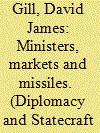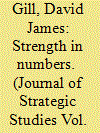| Srl | Item |
| 1 |
ID:
099061


|
|
|
|
|
| Publication |
2010.
|
| Summary/Abstract |
Existing accounts of British efforts to achieve a nuclear non-proliferation treaty between 1964 and 1968 largely overlook the later stages of decision making within the Labour government. Scrutiny of previously classified sources reveals that a desire for entry into the European Economic Community had a much larger influence on the content and conduct of British non-proliferation policy than previously suggested. By 1967, Prime Minister Harold Wilson sought a secondary role in treaty negotiations, and left the running to the superpowers. This avoided unnecessary conflict with the countries of the Community, resentful of the Treaty's discriminatory terms, and helped to protect Britain's application to join the EEC. Although this bid was unsuccessful, ambitions for future membership continued to influence non-proliferation policy in 1968. Indeed, a desire for future entry into the EEC helps to explain why Britain became the first nuclear weapon state to ratify the Treaty.
|
|
|
|
|
|
|
|
|
|
|
|
|
|
|
|
| 2 |
ID:
100669


|
|
|
|
|
| Publication |
2010.
|
| Summary/Abstract |
Previous historical accounts have simplified the Labour government's decision to commission a four-boat strategic nuclear deterrent, or 'Polaris force', in early 1965. Utilising previously classified sources, this article shows that a number of key strategic concerns led the decision-making process. Nevertheless, broader economic and diplomatic considerations were also important in determining the size of the Polaris force. A tremendous balance of payments deficit and ongoing debates regarding levels of conventional and nuclear involvement in NATO certainly influenced the government's final decision. Moreover, competing strategic and economic interests resulted in continued debate throughout the decision-making process.
|
|
|
|
|
|
|
|
|
|
|
|
|
|
|
|